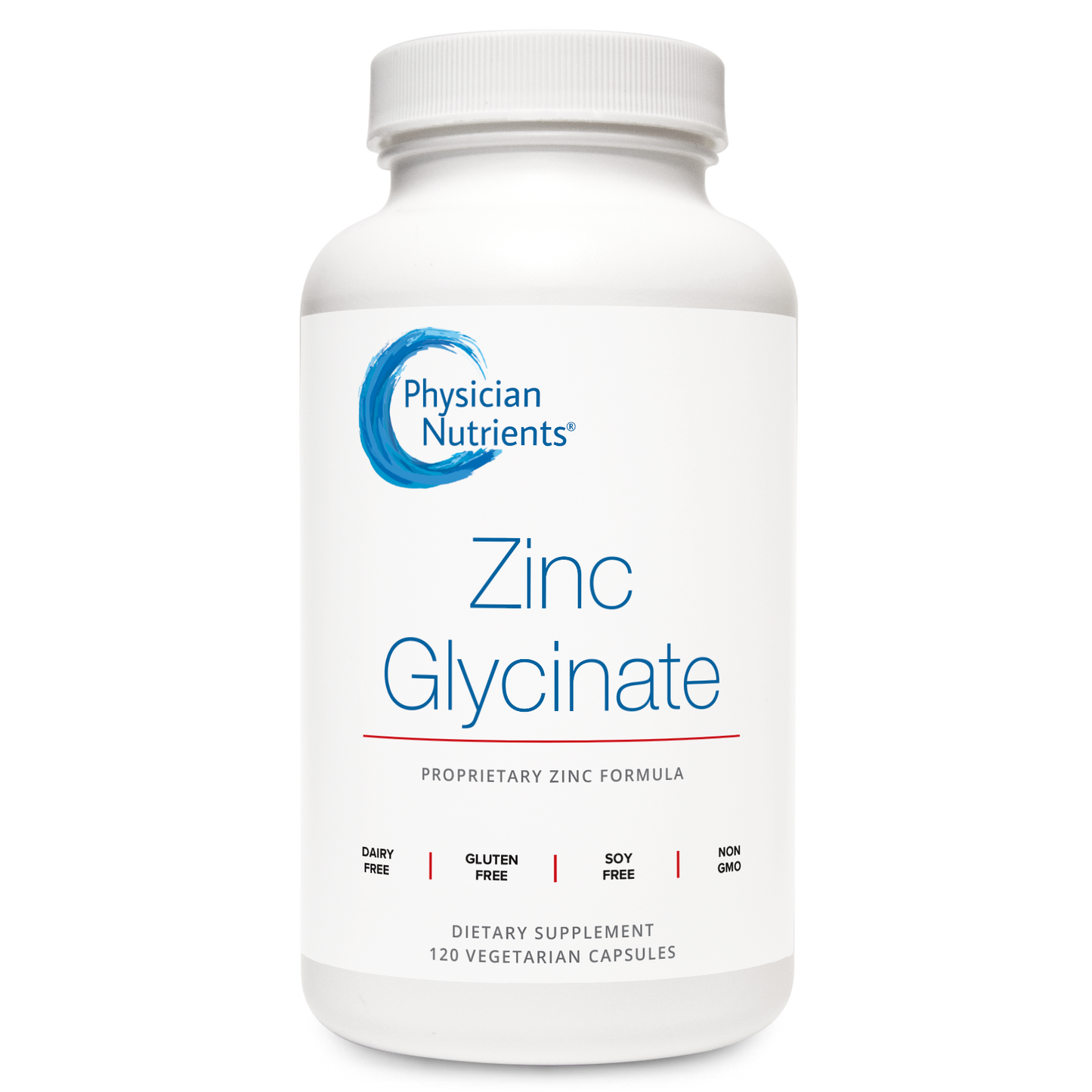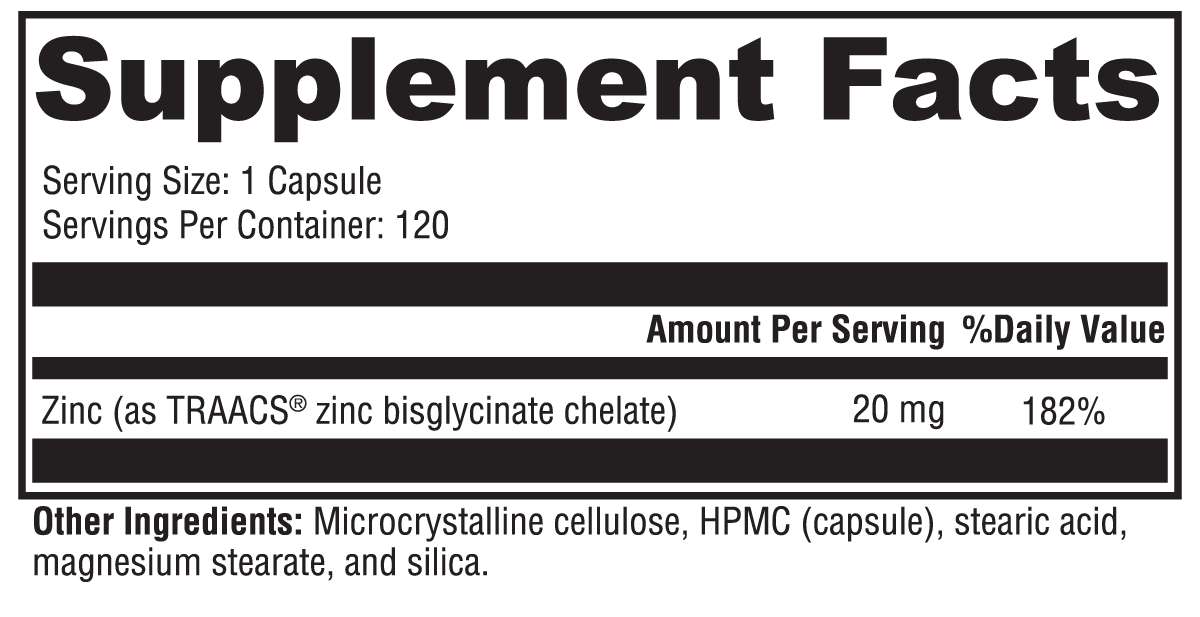Zinc Glycinate
Zinc Glycinate
Couldn't load pickup availability
Zinc Glycinate is a fully reacted, proprietary TRAACS® amino acid chelate formulated for enhanced absorption. As an essential mineral, zinc serves catalytic, structural, and regulatory functions in the body. Zinc ultimately supports immune and neurological function, growth, taste acuity, nutrient metabolism, and reproductive health.*
All Physician Nutrients® Formulas Meet or Exceed cGMP Quality Standards
Details
120 Vegetarian Capsules
Applications
- Supports Enzymatic Reactions and Protein Metabolism*
- Supports Immune and Reproductive Health*
- Supports Antioxidant Activity*
- Plays a Role in Sensory Perception*
Directions: Take one capsule daily or as directed by your healthcare practitioner.
Consult your healthcare practitioner prior to use. Individuals taking medication should discuss potential interactions with their healthcare practitioner. Do not use if tamper seal is damaged.
Does Not Contain: Wheat, gluten, corn, yeast, soy, animal or dairy products, fish, shellfish, peanuts, tree nuts, egg, ingredients derived from genetically modified organisms (GMOs), artificial colors, artificial sweeteners, or artificial preservatives.
*These statements have not been evaluated by the Food and Drug Administration. These products are not intended to diagnose, treat, cure, or prevent any disease.
Supportive Science
Zinc is an essential trace mineral and serves important roles in the body. More than 300 enzymes depend on zinc for their normal activities in cellular metabolism. As a cofactor, zinc participates in carbohydrate and protein metabolism as well as copper-zinc superoxide dismutase (CuZnSOD) antioxidant activity. Zinc’s role in supporting immune function includes regulating T lymphocytes, natural killer cells, CD4 cells, and interleukin II. A review of the research suggests that “zinc supplementation can significantly reduce the morbidity and mortality of apparently well-nourished children and shorten the time to recovery from acute [health problems]”*
Zinc’s pivotal role in protein metabolism translates into a pivotal role in wound healing, DNA synthesis, normal inflammatory response, and normal growth and development during childhood, adolescence, and pregnancy. Zinc helps maintain the structural integrity of cell membranes; it assists them in their normal function and protects them from oxidative damage. Research in human subjects of various ages suggests that zinc supplementation decreases oxidative stress markers, supports a normal response to inflammation, and appears to be a factor in balancing TH1 and TH2 immune cell activity. Skin and mucous membranes also depend on zinc for their maintenance and integrity.*
Zinc and vitamin A have a fundamental relationship as zinc is required for synthesis of retinol-binding protein—the protein that transports vitamin A in the blood. Zinc is also essential to the production of an enzyme that converts vitamin A to one of its active forms, and this helps support vitamin A’s vital role in night vision. Zinc supports healthy vision in general, especially as we age. Zinc’s role in sensory perception extends not only to vision but also to normal taste and smell acuity.
Zinc is highly concentrated in the liver, pancreas, kidneys, bone, muscles, eyes, prostate gland, sperm, skin, hair, and nails. The mineral is required for sperm maturation and fetal development. The endocrine system relies on adequate zinc status to assist in the regulation of insulin activity and the conversion of thyroxine (T4) to the active thyroid hormone triiodothyronine (T3). Zinc’s regulatory role extends to gene expression, cell signaling, and nerve impulse transmission, as well as normal apoptosis.*
The body has no specialized system for storing zinc, so daily intake and absorption is essential. Phytates—elements found in plantbased, high-fiber foods—can bind minerals (including zinc) and inhibit their absorption. Therefore, the bioavailability of dietary zinc may be compromised. Other minerals, including iron, calcium, and copper, can interfere with zinc absorption, further affecting zinc nutriture. Gastrointestinal and urinary zinc losses should be considered as well. Assessment of overall zinc status must take into account not only intake but also absorption and retention. Zinc Glycinate —an Albion® TRAACS amino acid chelate—is a high-potency source of zinc formulated for enhanced absorption. In this form, zinc is coupled with two glycine molecules to facilitate its absorption across the intestinal wall and reduce interference from phytates and competing minerals.*
*These statements have not been evaluated by the Food and Drug Administration. These products are not intended to diagnose, treat, cure, or prevent any disease.
Share




